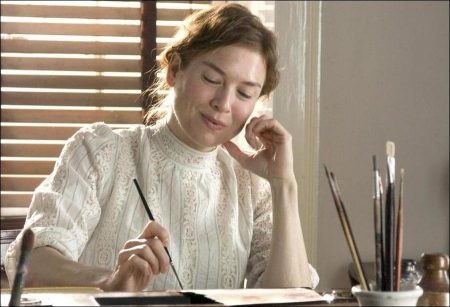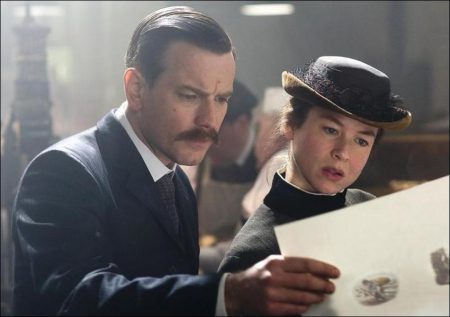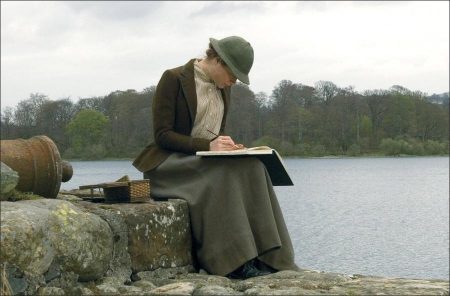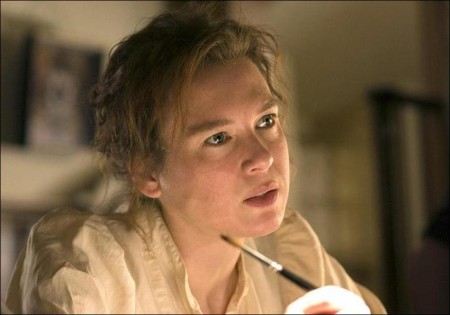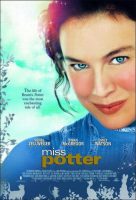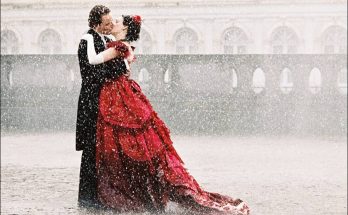Tagline: The life of Beatrix Potter was the most enchanting tale of all.
Miss Potter movie storyline. In 1902, in London, the spinster Beatrix Potter lives with her bourgeois parents. Her snobbish mother, Helen Potter, had introduced several bachelors to Beatrix until she was twenty years old, but she had turned them all down. Beatrix Potter has been drawing animals and making up stories about them since she was a child, but her parents have never recognized her as an artist. One day, Miss Potter offers her stories to a print house, and a rookie publisher, Norman Warne, who is delighted with her tales, publishes her first children’s book.
This success leads Norman to publish two other books, and Miss Potter meanwhile becomes the best friend of his single sister Millie Warne. Soon Beatrix and Norman fall in love with each other, but Helen does not accept that her daughter would marry a “trader”. However, Beatrix’s father Rupert Potter proposes that his daughter spend the summer with his wife and him in their country house in Lake District, and if she is still interested in Norman after the summertime, he would bless their marriage. When Miss Potter stops receiving letters from Norman, she is disappointed. Then one day she receives a letter from Millie explaining what had happened to Norman.
Biography of children’s author Beatrix Potter, including how she overcame a domineering mother and the chauvinism of Victorian England to become a best-selling author. Beatrix Potter was a literary phenomenon of the early 20th Century. At a time when most young women of her class aimed only to make a good marriage, Beatrix became an iconic figure, swimming quietly, but with great fortitude, against the tide.
She created a series of books and characters that are as beloved today as they were a hundred years ago, and since their publication they have never been out of print. She was also a distinguished painter and – had she been a man – her botanical drawings would have been snapped up by the Royal Horticultural Society at Kew Gardens.
In addition, by the time she died in 1943, Beatrix Potter had purchased vast swathes of the Lake District that she left to the then fledgling British conservation trust, the National Trust. That so much of this glorious countryside that inspired her, remains as it was in Beatrix Potter’s day for others to enjoy, is her bequest to the nation. This is her story…
About the Production
“When I first read the script of Miss Potter I felt I knew exactly who Beatrix Potter was,” said actress Renée Zellweger. “I understood why her growing up informed the woman she became. I understood why she became more and more reserved because of the restrictions placed on her.”
Renée Zellweger embarked on a voyage of discovery when she accepted the invitation to play English writer and artist Beatrix Potter. Knowing the characters that Potter created from her fertile imagination—Peter Rabbit, Mrs. Tiggy-Winkle, Jemima Puddleduck, and friends—but little of the woman herself, Zellweger immersed herself in a wealth of research. “There are so many contradictions in terms of what she hoped for in her life, and the choices she made. It made for a fascinating journey to find the best way to be accurate, to put the pieces of the puzzle together. Nothing was easy, nothing was blatantly obvious, nothing was really clear.”
“There is nothing over-produced or over-rehearsed about Renée’s performance,” said director Chris Noonan. “There’s real spontaneity. You know she has an anarchic, subversive sense of humor, and when you learn more about Beatrix Potter, you discover she had real wit, and was far earthier than you might suppose.”
Those who immediately think cuddly bunnies and nursery plates when they hear mention of Beatrix Potter’s name, are in for a major shock. Miss Potter was an artist of infinite skill, her botanical drawings would have been accepted all over the world had she been a man. She was an independent free thinker who fell in love with her publisher, Norman Warne. She left a publishing legacy that has enchanted every generation since. She left vast swathes of England’s beautiful Lake District to the nation, in bequests to the—then infant—National Trust. And it is because of Beatrix Potter that the Lake District remains as intact and glorious today as it was when she first saw it over a hundred years ago.
“I don’t think many people know a great deal about her life,” said director Chris Noonan. “A vision of Beatrix that I’ve had from the beginning is a modern woman placed into the suffocating social environment of the turn of the 20th Century.”
Australian Chris Noonan entered the frame to direct Miss Potter in spring 2004. The more he read, and researched, the more Noonan became fascinated by the woman, her life and her achievements. Signing Noonan for the project was inspirational—the director of BABE had waited a decade before choosing his follow-up movie. “I was offered every project under the sun, but I just couldn’t work up any enthusiasm for them. And when I did find something, the producers didn’t want to concentrate on what I found interesting about it.”
Miss Potter had a somewhat meandering journey to the screen. Richard Maltby Jr., Tony award winning writer of musicals including “Ain’t Misbehavin,” “Fosse” and “Ring of Fire” wrote the screenplay in the early 1990s.
“I knew Beatrix Potter because I had young children at the time,” Maltby explained. “We had the books. I read the blurb about her and it said she was unmarried. She wrote the books, moved to the Lake District, and after that she wrote no more stories.
“I found it quite fascinating that a woman artist with such a rich fantasy life should give up writing.” Maltby found a biography about Beatrix Potter while on vacation, and read it and was further intrigued. Because of his background in musical theatre, his first instinct was “Miss Potter: the musical,” only to discover that in the late twentieth century nobody wanted to make a musical.
The screenplay came to the attention of producer David Kirschner. Kirschner started collecting children’s literature when he was eight years old, graduating as an older person to collecting first editions (not just Beatrix Potter, but also Peter Pan and other English Classics). How could he not be drawn to MISS POTTER?
For almost a decade he and his producing partner Corey Sienega, struggled to bring the project to fruition. Then a chance meeting between David Thwaites of Phoenix Pictures and Richard Maltby’s agent at the Sundance Film Festival in 2003 upped the stakes. “Richard Maltby’s agent said, ‘You’re English, you’ll like this script,’” recalled Thwaites. He took the screenplay back to Phoenix Pictures where his colleagues Mike Medavoy and Arnold Messer also responded well.
“It seems to me that the instinct you have for a script is based on how much you enjoy reading it the first time. MISS POTTER was just a really lovely story and it was unusual, because it was about a character that was well known, but little known,” Thwaites said.
The partnership between David Kirschner Productions and Phoenix Pictures meant that, at last, MISS POTTER was confidently looking towards production. The first people whose blessing was needed was Beatrix Potter’s publishers, Frederick Warne & Co, guardians of the Potter imprint. Although now part of the massive Penguin publishing group, Warne & Co operate independently within Penguin. They approved the screenplay and were fundamentally involved in the production from the very start, offering help, advice and a massive amount of informed research material.
Continue Reading and View the Theatrical Trailer
Miss Potter (2007)
Directed by: Chris Noonan
Starring: Renée Zellweger, Ewan McGregor, Emily Watson, Barbara Flynn, Bill Paterson, Lloyd Owen, Anton Lesser, David Bamber, Patricia Kerrigan, Lucy Boynton, Justin McDonald
Screenplay by: Richard Maltby, Jr.
Production Design by: Martin Childs
Cinematography by: Andrew Dunn
Film Editing by: Robin Sales
Costume Design by: Anthony Powell
Set Decoration by: Tina Jones
Art Direction by: Grant Armstrong, Mark Raggett
Music by: Nigel Westlake
MPAA Rating: PG for brief mild language.
Studio: Metro Goldwyn Mayer
Release Date: March 9, 2007
Views: 136
